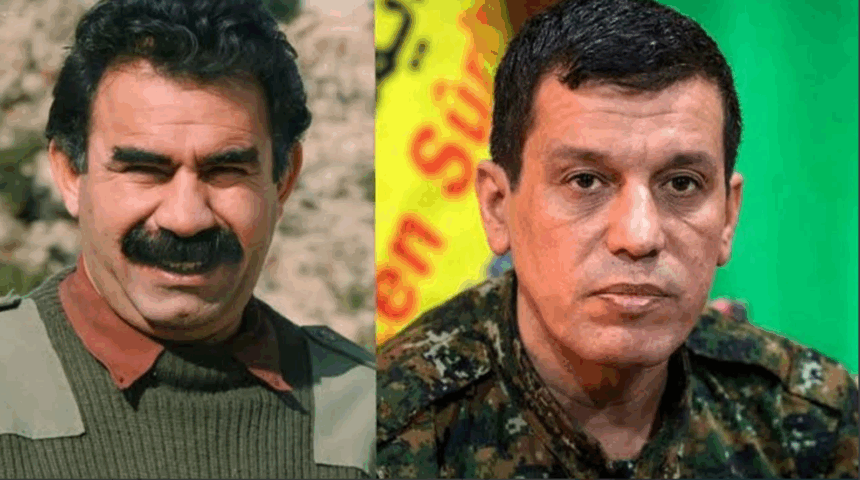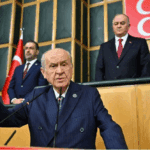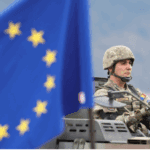Mazlum Abdi, commander of the Kurdish-led Syrian Democratic Forces (SDF), has said he is ready to travel to Turkey and meet jailed Kurdistan Workers’ Party (PKK) founder Abdullah Öcalan, as Turkish lawmakers prepare a politically explosive first parliamentary visit to his island prison under a new peace initiative.
In an interview with BBC Turkish, Abdi said direct talks are needed between the Syrian Kurdish forces and Öcalan and that he is willing to go to Turkey if it would help push the process forward. He added that they already exchange views with Öcalan through letters and argued that only the PKK leader can clarify the status and future of PKK cadres and fighters currently present in northern Syria.
Öcalan, 76, founded the PKK in the late 1970s and has led a Kurdish armed movement that has fought the Turkish state since 1984. The PKK began by calling for an independent Kurdish state but later shifted to demands for autonomy and for cultural and political rights within Turkey. The conflict has killed tens of thousands of people over four decades and spread from Turkey’s southeast into neighboring Iraq and Syria.
Turkey and its Western allies designate the PKK as a terrorist organization. Ankara also insists that the Kurdish People’s Protection Units (YPG), the main component of the SDF and a key partner of the U.S.-led coalition against the Islamic State in Syria, are part of the same structure as the PKK.
From ceasefire to parliamentary commission
Öcalan was captured in 1999, tried and convicted, and has been held ever since on İmralı Island, a small high-security prison island in the Sea of Marmara between İstanbul and Bursa. For many years he was the sole inmate on the island, and access by his lawyers and family has been tightly restricted, drawing criticism from the Council of Europe’s Committee for the Prevention of Torture.
In early 2025, after a call from Öcalan, the PKK declared a ceasefire, then announced that it would disband and end its armed campaign against Turkey. The group later held a symbolic ceremony in northern Iraq in which some fighters burned weapons in front of cameras as a signal that the armed struggle was over.
President Recep Tayyip Erdoğan has described this period as a “new phase” and says he wants to build a “terrorism-free Turkey,” while repeatedly insisting that the state will not bargain over the country’s unity or territorial integrity.
To manage the transition, parliament created the National Solidarity, Brotherhood and Democracy Commission in August, a 51-member cross-party body tasked with hearing from officials, experts and stakeholders and drafting the legal architecture of the post-conflict period. The commission is chaired by Parliament Speaker Numan Kurtulmuş of the ruling Justice and Development Party (AKP).
Members come from the AKP, the far-right Nationalist Movement Party (MHP), the pro-Kurdish Peoples’ Equality and Democracy Party (DEM Party) and several small left-wing parties. The secular main opposition Republican People’s Party (CHP) and the nationalist İYİ (Good) Party, however, have kept their distance and adopted a more critical stance.
Vote to visit İmralı — and political fault lines
On Friday the commission voted to send a small delegation to İmralı to meet with Öcalan and bring back a written record of his views on the origins of the conflict, Turkish–Kurdish relations, disarmament and needed legal reforms.
The AKP, MHP, DEM Party and two small left-wing parties voted “yes” in a closed session. The CHP did not participate in the vote and decided it would not send a member to the island. The İYİ Party has boycotted the commission from the start and maintains that no lawmaker should visit Öcalan under any circumstances.
Kurdish media and several opposition outlets reported on Monday that the visit had already taken place, with a three-person delegation flying by helicopter from İstanbul to İmralı at midday. According to these reports, the delegation included AKP lawmaker Hüseyin Yayman, MHP deputy chair Feti Yıldız and DEM Party group deputy chair Gülistan Kılıç Koçyiğit.
The Mezopotamya news agency said the lawmakers met Öcalan on the island, returned to the mainland in the afternoon and that the entire meeting was recorded in official minutes. It reported that the written minutes would be delivered to Speaker Kurtulmuş and then presented to the full 51-member commission for discussion.
Conflicting reports and official silence
Other outlets presented a different picture and claimed the visit had not yet taken place and was more likely to be held on Tuesday or Wednesday.
TGRT Haber’s Ankara bureau chief Fatih Atik wrote on social media that the delegation did not go to the island on Monday and that reports of a same-day visit were inaccurate.
İlke TV, meanwhile, reported that it had spoken by phone with AKP lawmaker Hüseyin Yayman, who said he had not gone to the island, did not know who had, and that information about a meeting on Monday was wrong. At the same time, the station cited its own sources as saying they had “definitely” confirmed that a visit by commission members had taken place and that they had briefed Kurtulmuş after returning to Ankara.
By Monday evening there was still no written or oral statement from the parliament speaker’s office, the commission or the justice ministry confirming or denying that lawmakers had met with Öcalan that day. Pro-government outlets reported instead that the visit would be coordinated by Turkey’s National Intelligence Organization (MİT) and that no photographs or video from the meeting would be released.
Pressure on CHP and harsh criticism from İYİ Party
The decision to go to İmralı has exposed sharp divisions among Turkish political actors.
PKK commander Murat Karayılan, speaking to a station close to the organization, said the CHP had made a “big mistake” by refusing to send a representative to meet Öcalan. He warned that if the party did not reverse its position, “they will suffer,” arguing that the PKK was disbanding “for the sake of a solution” and that Ankara now had to move to a “second stage” based on legal and judicial reforms.
Karayılan insisted that the Kurdish question cannot be resolved without hearing from Öcalan and that the parliamentary commission “must” go to İmralı to listen to him directly.
The CHP counters that it supports a peaceful and political solution but argues that such a historic step should not unfold behind closed doors, in a process shielded from public scrutiny. Party officials say parliament and society need full transparency about any contacts with Öcalan if the process is to be legitimate and sustainable.
The DEM Party has said it attaches great importance to CHP participation, arguing that any lasting settlement requires consent and support from both Kurdish voters and Turkey’s main secular opposition.
The İYİ Party, founded by former MHP members, has condemned the visit outright and accuses Erdoğan and MHP leader Devlet Bahçeli of betraying the memory of those killed in PKK attacks. İYİ Party deputy group leader Turhan Çömez held up photos of teachers killed by the PKK in parliament and told lawmakers from the AKP, MHP and DEM Party that they should “show these while you shake that bloody hand.”
Syria, the SDF and the regional dimension
Abdi’s comments highlight how developments in Turkey are closely tied to northern and eastern Syria, where the SDF controls territory and has its own fraught relationship with Ankara and with the new authorities in Damascus.
He said the peace steps in Turkey are one reason there is currently a ceasefire between SDF forces and the Turkish army in northern Syria and suggested that if the Turkish process succeeds, that ceasefire could become permanent.
Abdi also recalled that the SDF signed an agreement on March 10 with the new Syrian authorities to integrate its forces into the Syrian army. He said there is a preliminary understanding on military arrangements but not yet on the constitution or on the political and cultural rights of Kurds and other communities in Syria.
Turkey, for its part, says any Kurdish settlement must also cover armed Kurdish structures in Syria and calls on the SDF to give up arms in line with Öcalan’s call for disarmament.
“In this context,” Abdi said, he wants to be “a supporting party, not an obstacle,” and that he is ready to travel to Turkey and take part in talks if that would help move the process forward.



